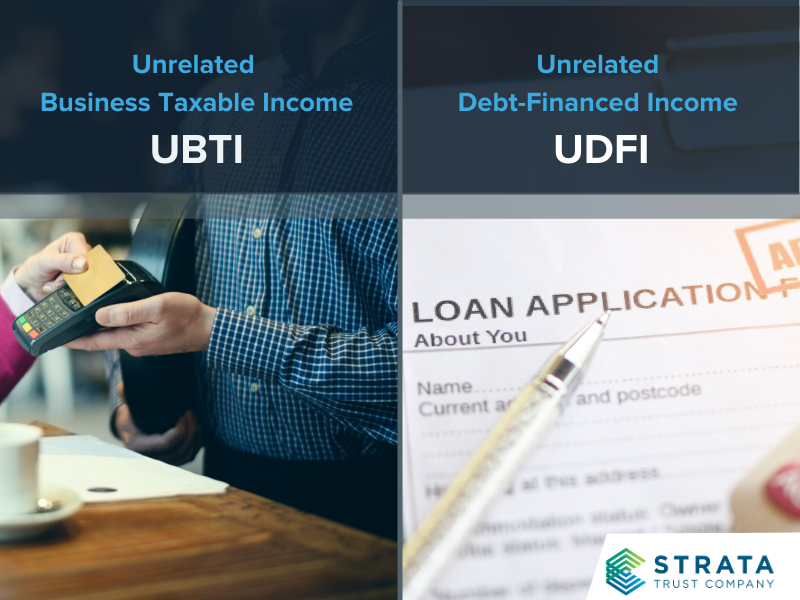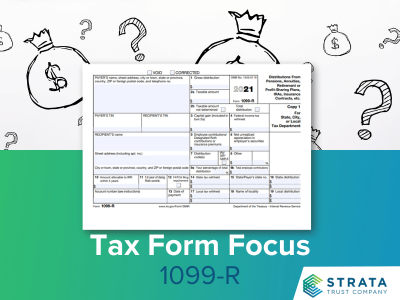*IRS update March 29, 2021: 2020 tax returns and IRA contribution deadlines extended to May 17, 2021 (June 15, 2021, for residents of Texas, Oklahoma, and Louisiana).
If so, your IRA might owe UBTI or UDFI tax.
Certain types of investments in a self-directed IRA may generate income that is taxable in the year earned (instead of deferred until withdrawn from the IRA). This type of income is referred to as either unrelated business taxable income (UBTI) or unrelated debt-financed income (UDFI).
Examples of assets that tend to generate taxable income include limited partnerships (LPs) and limited liability companies (LLCs), and leveraged real estate. If you have IRA investments that could generate $1,000 or more of this type of income per year, work with your tax professional to make certain you have a tax ID for your IRA and you are receiving and filing the right tax forms to report your IRA income.
Understanding Unrelated Business Taxable Income (UBTI)
The tax benefits associated with investing in an IRA are designed to encourage individuals to save for retirement. IRAs were not designed to be a tax shelter for businesses. Consequently, the tax code requires that IRAs receiving certain types of income from a trade or business that is not substantially related to the IRA’s tax-exempt purpose (saving for retirement) pay tax on that business income. UBTI generally includes income earned from selling goods or performing services with the intent to profit in an ongoing trade or business. Examples could be a restaurant, a retail store, an automotive repair shop or any type of service business that earns income but that income is “unrelated” to the purpose of the IRA, according to IRS rules. Because the income is earned within a trust, UBTI is taxed at the trust tax rates.
Certain types of income are excluded from UBTI:
• Interest
• Dividends
• Royalties
• Capital gains from the sale of assets
• Rents (if not debt-financed)
Understanding Unrelated Debt-Financed Income (UDFI)
If an IRA is invested in an LP or LLC that has obtained debt financing to purchase real estate, or the IRA has obtained a non-recourse promissory note to purchase real estate, any income generated by that property is taxable income for the IRA as UDFI. The income will be taxable in proportion to the debt owed on the property. This is generally determined based on the highest amount of debt carried within the past 12 months. As the IRA pays down the debt, the percentage of income that is taxable decreases as well. If the IRA sells the property and there is any debt during the preceding 12-months, a percentage of the gain will be considered UDFI. If the investment is held longer than 12 months after the loan is paid off, the gain is not subject to tax.
Reporting UBTI/UDFI
If your IRA earned UBTI or UDFI of $1,000 or more for 2020, an IRS Form 990-T, Exempt Organization Business Income Tax Return, must be filed with the IRS on behalf of the IRA by *May 17, 2021, to report and pay the tax. You are responsible for determining if Form 990-T must be filed. You may receive information from your investment sponsor to assist with calculating UBTI or UDFI.
For example, if the IRA is invested in an LP or LLC, the IRA will receive a Schedule K-1, Partner’s Share of Income, Deductions, Credits, etc., reporting income for the year. Box 20 will report if there is any UBTI, using code V.
Consult your tax professional for assistance:
• Calculating UBTI or UDFI
• Securing an Employer Identification Number (EIN) for the IRA
• Completing Form 990-T
Once Form 990-T has been completed, provide the form to STRATA Trust with your authorization to file the form and pay the tax from your IRA account.
The IRS may assess penalties and interest for late or missing Form 990-T filings. The minimum penalty for failure to file a return within 60 days of the due date is the lesser of the tax due or $435.
For More Information
You can find more information on UBTI/UDFI in IRS Publication 598, but identifying and calculating UBTI/UDFI is challenging. There are multiple exceptions, exclusions, and deductions that apply. Seek professional tax advice if you are invested in an alternative investment that might generate UBTI or UDFI.









